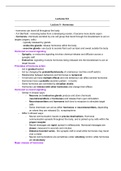Class notes
NEUR1202 - Classes 5-8 Summary/Notes - Exam Study Guide
- Course
- NEUR 1202 (NEUR1202)
- Institution
- Carleton University (CU )
These are my detailed and organized notes of classes 5-8 of Kim Hellemans NEUR1202 class at Carleton University in the 2021 term. All important information is bolded and easy to find, this document is perfect study material for quiz 2 and the exam. Happy studying!
[Show more]



